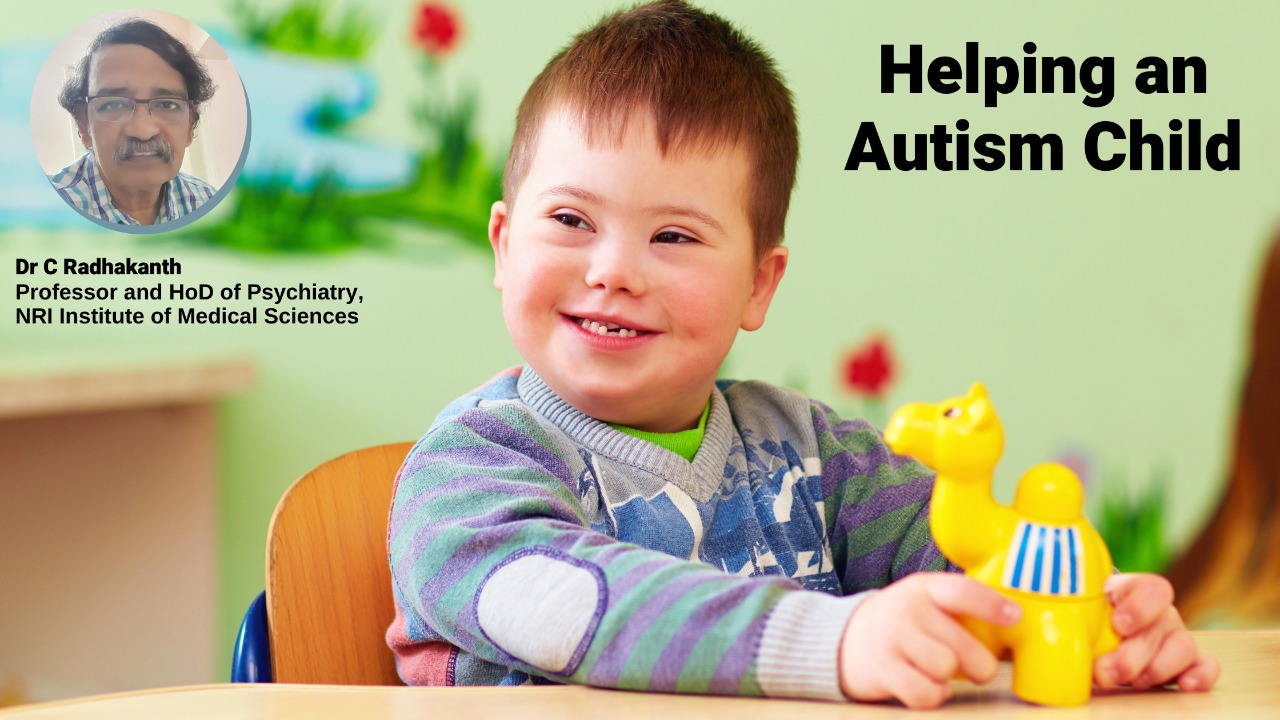Some tips to overcome challenges while dealing with Autistic children
April 10, 2021, 2:15 p.m.

With the Autism week culminating this week, Dr. C. Radhakanth, M.D.(Psych), gives insights on helping Autistic children. Dr Radhakanth is a Professor and HOD of Psychiatry, NRI Institute of Medical Sciences, Visakhapatnam.
Children with autism are identified by delayed and deviant speech, poor social relatedness and eye contact, odd mannerisms and stereotyped behaviors with hypo or hyperactivity, usually before the age of 3 years. Asperger’s syndrome is a form of Mild autism with later age of onset, good speech and poor social relatedness. Pervasive Developmental Delay (PDD) is another term used to describe a similar set of conditions.
“Will this child become fully normal?” Most caregivers ask pointing to their autistic child. “Near normal but not fully normal” is the correct answer but one that brings tears to parents with a newly diagnosed Autism Spectrum Disorder (ASD) child. High functioning autism children perform very well in all spheres – academic, social, marital, employment. It is not so for others. Low functioning autism children who have severe autism may be quite difficult to handle. How to help children across the spectrum?
Mild autistic should go to normal schools and get into the mainstream. Additional coaching by live tuition or by technology helps them accelerate their learning. No negatives, no criticism and no hyper intimacy is the mantra. Appreciating them or giving social reinforcement after they perform a task decently motivates them.
Moderate autistic might benefit from a special school that also teaches academics. Speech Language pathologists, occupational therapists, physiotherapists, special educators in addition to normal teachers can produce change in one-on-one setting or in small class sizes of 3 to 5 children to a teacher. Sensory Integration, Applied Behavior Analysis (ABA) and TEACCH programs are beneficial. Excess behaviors in the form of stereotyped behavior and hyperactivity are amenable to Behavior therapy.
Severe ASD might require more intensive Speech therapy, Occupational therapy (OT) and special education in Activities of Daily Living (ADL) so that communication and self-help improve and their disability is reduced. Day care centers, Rehabilitation centers, Self-help groups and Voluntary organizations (NGOs) offer additional care.
Prognosis and expectation of improvement depend on the amount of Speech and Language function recovery, Self-help skills, eye contact and social relatedness. Behavioral manifestations like grimaces, mannerisms and stereotypes however do not preclude improvement though they look odd. Teaching Alternative behavior might help, opines Dr Radhakanth.
Low functioning autistic might have minimal or zero speech, be behaviorally disturbed and aggressive at times, have comorbid seizures or fits, poor eye contact, preference for inanimate objects to living beings and be lost in their own world. Residential care, special schools, rehabilitation centers, sheltered workshops might be able to rehabilitate them.
AAC – Augmentative and Alternative Communication devices help with communication. Music, Art, Games, Cooperative Play might be therapeutic. Gluten free and Casein free diet that avoids wheat and milk products help reduce hyperactivity in some children. High sugars, syrups, sweets, chocolate and colored food are best avoided. Stem cell therapy is not useful. An inclusive environment that rewards good behavior, sets limits, prevents excess behaviors, and promotes multi modal, multi-sensory, Audio-visual teaching may be best for the child.
Early intervention before the age of 3 years is very effective. Psychosocial treatments are preferable compared to medication. They can complete graduation and even marry and beget children if identified and treated early. Since 1 in 85 children develop autism, it is time this disorder is taken seriously and remedied by improving awareness in the public.
Important : If you are making an impact in the world, Please send us your story at : sociostoryfoundation@gmail.com and we will try to cover you.